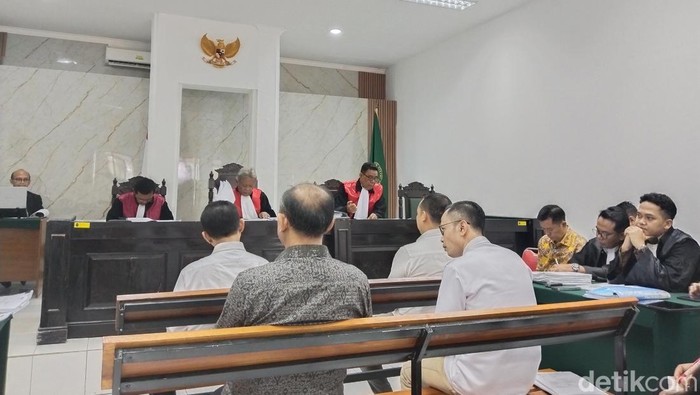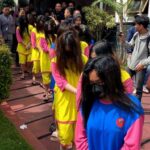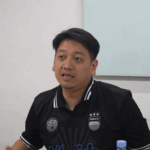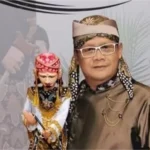Bandung —
The corruption trial related to the Bandung City Transportation Department project involving former secretary Ema Sumarna has resumed. During the hearing, it was revealed that the 2022 project addressing «Dark Bandung» was implemented without prior planning or research.
This fact emerged during the trial of the accused—three Bandung City Council members, Ahmad Nugraha, Yudi Kahyadi, and Riantono, along with former council member Ferry Kahyadi—at the Bandung Corruption Court on Jl Surapati. All four testified in favor of Ema Sumarna.
In 2022, social media discussions highlighted «Dark Bandung,» describing severe issues in West Java’s capital, including rampant street crime, traffic congestion, and extreme nighttime darkness.
The indictment stated that the revised 2022 regional budget allocated approximately IDR 47.3 billion to address «Dark Bandung,» including IDR 19 billion for street lighting, IDR 5 billion for smart CCTV cameras, and IDR 2.5 billion for traffic lights (APILL).
However, this budget was proposed without proper planning. Prosecutors revealed this when questioning two former PDIP faction council members, Riantono and Ahmad Nugraha.
When asked why funds were allocated without planning, Riantono claimed the purchases were urgent due to Bandung’s pressing issues. «It was an emergency—Dark Bandung. We didn’t prioritize studies; the city government should handle this, not the budget committee,» he stated.
Ahmad Nugraha, then PDIP chair, echoed this, citing numerous constituent complaints. «The problems were already critical,» he said.
Tensions flared when prosecutors pressed Riantono on the budget’s justification. A defense lawyer objected, calling the questions repetitive. The judge intervened, urging patience as prosecutors sought factual clarity.
The trial adjourned temporarily, with Ema Sumarna’s testimony next on the agenda.
Sumarna is accused of bribing officials with IDR 1 billion to expedite transportation projects. Ahmad Nugraha allegedly received IDR 200 million, Riantono IDR 270 million, Yudi Kahyadi IDR 500 million, and Ferry Kahyadi IDR 30 million.
Sumarna also faces charges for accepting IDR 626.7 million in gratuities between 2020–2023. Charges include violations of Articles 5(1)(b), 5(1)(a), and 13 of Law No. 20/2001 on Eradicating Corruption, alongside related Criminal Code statutes.
Other defendants are charged under Articles 12(b), 12(a), and 11 of the same law.
Bandung City Transportation Department
The Bandung City Transportation Department is a government agency responsible for managing and regulating transportation systems in Bandung, Indonesia. Established to address urban mobility challenges, it oversees public transit, traffic management, and infrastructure development to improve efficiency and reduce congestion in the rapidly growing city. Its initiatives reflect Bandung’s efforts to modernize transportation while balancing historical urban planning and contemporary needs.
Bandung Corruption Court
The **Bandung Corruption Court** is a specialized judicial body in Indonesia dedicated to handling corruption cases. Established as part of Indonesia’s anti-corruption efforts, it operates under the **Corruption Eradication Commission (KPK)** and the **Indonesian Supreme Court** to prosecute graft offenses. The court plays a key role in combating corruption in West Java, reflecting the country’s broader legal reforms since the early 2000s.
Jl Surapati
Jl. Surapati (Surapati Street) is a notable road in Bandung, Indonesia, named after Untung Surapati, a 17th-century Javanese freedom fighter who resisted Dutch colonial rule. The street is part of Bandung’s historic urban layout, reflecting the city’s colonial past and modern development. Today, it is a bustling area with shops, cafes, and cultural landmarks, blending historical significance with contemporary life.
Dark Bandung
«Dark Bandung» refers to a mysterious and lesser-known side of Bandung, Indonesia, often associated with urban legends, abandoned places, and eerie histories. The term may evoke sites like the old Dutch colonial buildings, haunted locations, or the city’s underground tunnels rumored to date back to World War II. While not an official cultural site, it reflects local fascination with Bandung’s hidden past and supernatural folklore.
West Java’s capital
West Java’s capital, Bandung, is a vibrant city known for its colonial architecture, cool climate, and thriving arts and culinary scenes. Established in the early 19th century during Dutch colonial rule, it became a popular highland retreat and later a center for education and technology in Indonesia. Today, Bandung is also celebrated for its creative industries, fashion outlets, and historical landmarks like the Gedung Sate.
PDIP faction
The **PDIP Faction** (Faction of the Indonesian Democratic Party of Struggle, *Fraksi PDI-Perjuangan*) is the legislative group of the PDIP party in Indonesia’s People’s Representative Council (DPR). Founded as part of PDIP, which emerged in 1999 from the original Indonesian Democratic Party (PDI), the faction represents the nationalist and secular ideology of former President Megawati Sukarnoputri. It is one of the largest and most influential factions in Indonesian politics, advocating for social justice, democracy, and economic nationalism.
Law No. 20/2001 on Eradicating Corruption
«Law No. 20/2001 on Eradicating Corruption» is an Indonesian legal framework established to combat corruption by defining criminal acts, penalties, and enforcement mechanisms. Enacted during a period of significant anti-corruption reforms following the fall of Suharto’s regime, it strengthened legal tools for prosecuting corrupt practices and laid the foundation for the Corruption Eradication Commission (KPK). The law reflects Indonesia’s commitment to governance reform and accountability in the post-authoritarian era.
Criminal Code
The *Criminal Code* refers to a comprehensive legal document that outlines the laws, definitions, and penalties related to criminal offenses in a particular country or jurisdiction. Historically, such codes have evolved from early legal systems (like the Code of Hammurabi) to modern statutes that reflect societal values and justice principles. For example, Canada’s *Criminal Code* was established in 1892, consolidating criminal laws into a single framework, while other nations have their own versions shaped by legal traditions and reforms.






